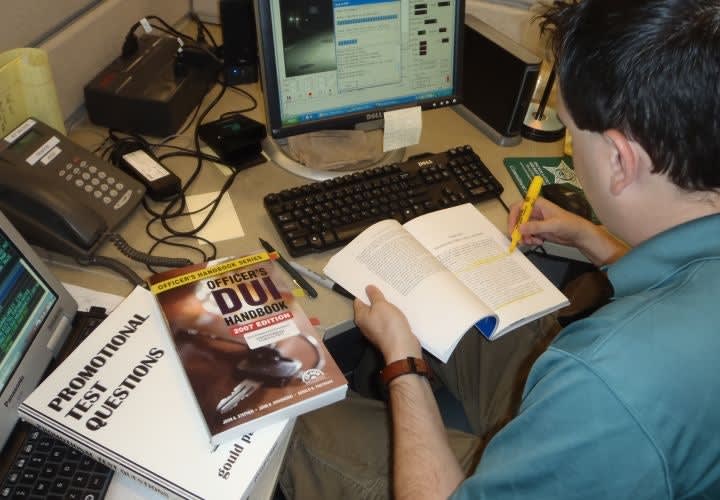Not to toot my own horn, but just in case you’re wondering why I’m qualified to write about this topic, I’ve taken and passed with flying colors a fair share of promotional exams in my time.
I scored the highest on my lieutenant’s exam years ago with a 98%. No, I’m not some Einstein with a photographic memory. I had to work my tail off. But certain tricks helped me store the information in my head, and they can do the same for you.
Here are some studying techniques that have worked for me in the past:
1) Read and Reread. Read all the test material at least three times through. The first time, just read it with no special emphasis on anything. This orients your brain to the task at hand. The second time, read to underline definitions and key concepts. The third time, pick a different pen color and underline superlative statements.
A superlative statement includes words like the most often, supervisors must, the best way, or should be. In other words, they are definitive statements that tell you a specific fact the author wants you to remember. These are where the heart of the test questions comes from.
Here is an example from my 2005 study material: “It is the 1st line supervisor who is in the best position to ensure that the goals of the agency are being accomplished.” A possible test question would then become, “Who is in the best position to ensure that the goals of the agency are being accomplished?”
2) Notebooks. There are three notebooks that you should create as part of your daily review. One consists of the questions and answers from the end of each chapter in the book. The second is filled with definitions and key concepts. And the third is filled with the author’s superlative statements. Remember, these are where a significant number of test questions come from.
3) Flash Cards. Place a question on the front and an answer on the back. Do not learn them in order. Shuffle them around each time you use them. Place the ones you answer correctly in one stack and then concentrate on the ones you don’t get right in another. In time you should only have one stack.
4) Group Study. I don’t like studying in a group, but many people do. The only advantage I see is in obtaining practice tests. If you have a study group of 10 people, have each person focus on one chapter and create a test for it. Everyone makes copies of their test to pass out to the other members of the group.
In this example, that means for your one test, you get nine back. The trick to this is having every answer backed up by a page number or reference so you can verify the answer. The members of the group are no smarter than you are, so double-check their work or you risk studying the wrong answers.
5) Policy and Procedure. Save yourself some time by narrowing your topic. First find out every reference in policy to the position you are testing for (sergeant, lieutenant, etc.). This becomes your first layer of study. The next step is to identify the rank immediately beneath that and learn its responsibilities.
For example, as a lieutenant, there will always be some type of reference that states something like, “and ensure that the sergeant’s tasks have been accomplished.” The last layer of policy you need to review is knowledge that applies to all ranks including pursuits, use of force, and discipline, termination, and appeals. It doesn’t hurt to be familiar with the next rank above either.
6) Test Taking. Taking tests is more about reading than knowledge. Read each question first and then all the answers before you mark your choice. Pick the best answer from the group and don’t get wrapped up in how poorly written or correct it actually is.
7) Mistakes. Everyone makes silly mistakes that hurt their scores. Eliminate them by slowing down and reading carefully. It can mean the difference between making it or not.
Amaury Murgado is a special operations lieutenant with the Osceola County (Fla.) Sheriff’s Office. He is a retired master sergeant from the Army Reserve, has 25 years of law enforcement experience, and has been a lifelong student of martial arts.
Related:Studying for Written Promotional Exams












